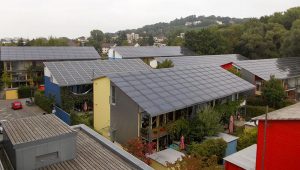
Arnold Plesse, CC BY 3.0, via Wikimedia Commons
Vauban, the 38 hectare former military base of the French armed forces, has been transformed into a new neighborhood close to the city center. Now, this attractive, family-friendly neighborhood houses 5,500 residents. It buzzes with civic engagement, community building, and environmentally-friendly living. Low-energy construction is mandatory, passive construction, plus-energy construction and the use of solar technology are standard for most.
The tree population has been preserved as far as possible. Green spaces between rows of houses provide green space and offer play areas for children. Parallel to the private structures, there are now a school, kindergartens, youth facilities, a civic meeting place, marketplace, and recreational and play areas. Green flat roofs store part of the rainwater, which is collected.
The residential area is traffic-calmed. A large proportion of households are car-free, and private vehicles are parked in one of the two neighborhood garages. Since 2006, the residential area has been served by a light rail system. Many residents happily live without cars and use public transport and bicycles instead.
Facts and figures
- Buildings must at least meet the Freiburg standard for low-energy construction (annual energy rating 65 kWh/m²). More than 277 residential units have even been

Poudou99, CC BY-SA 4.0, via Wikimedia Commons
built living up to passive house standards, which corresponds to a maximum energy use of 15 kWh/m²a.
- The solar houses on Merzhauser Strasse are energy-positive: they produce more energy than they consume.
- The heat supply for the entire neighborhood, with the exception of the passive houses, is provided by a woodchip-fired combined heat and power plant that also generates electricity, enough to cover the needs of approximately 700 households.
- Vauban’s population density of 12,500 inhabitants/km² is relatively high, corresponding roughly to the population density in the inner-city districts of many major German cities.




